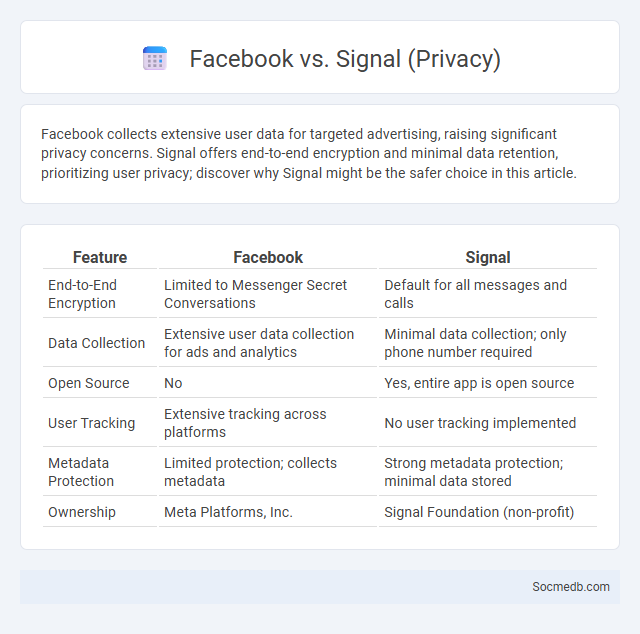
Photo illustration: Facebook vs Signal (Privacy)
Facebook collects extensive user data for targeted advertising, raising significant privacy concerns. Signal offers end-to-end encryption and minimal data retention, prioritizing user privacy; discover why Signal might be the safer choice in this article.
Table of Comparison
| Feature | Signal | |
|---|---|---|
| End-to-End Encryption | Limited to Messenger Secret Conversations | Default for all messages and calls |
| Data Collection | Extensive user data collection for ads and analytics | Minimal data collection; only phone number required |
| Open Source | No | Yes, entire app is open source |
| User Tracking | Extensive tracking across platforms | No user tracking implemented |
| Metadata Protection | Limited protection; collects metadata | Strong metadata protection; minimal data stored |
| Ownership | Meta Platforms, Inc. | Signal Foundation (non-profit) |
Introduction: The Importance of Privacy in Social Media
Protecting your personal information on social media platforms is crucial in a digital age where data breaches and identity theft are increasingly common. Ensuring robust privacy settings helps you maintain control over what you share and who can access your content, safeguarding your online reputation. A strong focus on privacy empowers you to enjoy social media while minimizing risks associated with unauthorized data use.
Facebook: A Brief Overview of Data Privacy Practices
Facebook employs advanced encryption technologies and regularly updates its privacy settings to protect your data. The platform allows users to control who can see their posts, access personal information, and manage ad preferences through detailed privacy dashboards. Despite ongoing concerns, Facebook's commitment to transparency has resulted in improved user awareness and stronger data protection protocols.
Signal: Commitment to User Privacy and Encryption
Signal prioritizes user privacy by implementing end-to-end encryption, ensuring that only you and the intended recipient can access your messages. Its open-source protocol undergoes regular security audits, reinforcing trust and transparency. The platform's commitment to minimal data collection protects your personal information from third-party access.
Comparing Privacy Policies: Facebook vs Signal
When comparing privacy policies, Facebook collects extensive personal data to personalize ads and improve user experience, often sharing information with third parties. Signal prioritizes user privacy by employing end-to-end encryption and minimal data collection, retaining only essential metadata for service functionality. Your choice between these platforms impacts how your personal information is managed and protected.
Data Collection Methods: What Facebook and Signal Gather
Facebook collects data through user profiles, interactions, location tracking, and third-party app integrations, enabling targeted advertising and behavioral analysis. Signal minimizes data collection by only storing essential metadata like registration information and device details while delivering end-to-end encrypted messages without accessing message content. These contrasting approaches highlight Facebook's extensive data aggregation versus Signal's privacy-centric model prioritizing minimal user information retention.
Data Breach History: Notable Incidents on Facebook
Facebook has experienced several data breaches affecting millions of users, including the 2019 Cambridge Analytica scandal where data from over 87 million profiles was harvested without consent. In 2021, a breach exposed personal details of more than 530 million users, including phone numbers and email addresses, raising concerns about privacy and security. These incidents highlight ongoing vulnerabilities in Facebook's data protection measures and emphasize the need for stricter regulatory oversight.
Signal’s Track Record: Has Signal Ever Been Breached?
Signal has maintained a strong track record in security, with no public data breaches reported since its launch. The app employs end-to-end encryption, ensuring that Your messages and calls remain private and inaccessible to unauthorized parties. Its commitment to open-source technology and regular security audits contributes to trust and widespread adoption among privacy-focused users.
User Control and Transparency: Which Platform Empowers Users?
You gain greater control and transparency on platforms like Twitter and Instagram, which offer robust privacy settings, detailed activity logs, and clear data usage policies. Facebook provides comprehensive user dashboards to manage ad preferences and personal information, enhancing your ability to tailor content visibility and data sharing. Platforms emphasizing user empowerment prioritize transparent algorithms and consent-driven data practices, ensuring you understand and influence how your information is used.
Privacy Features: End-to-End Encryption and Beyond
Social media platforms increasingly prioritize privacy features such as end-to-end encryption to secure user communications from unauthorized access. This technology ensures that only the sender and recipient can read the messages, enhancing confidentiality in personal and group chats. Beyond encryption, platforms implement advanced privacy settings, two-factor authentication, and data minimization practices to protect user information against breaches and surveillance.
Conclusion: Choosing the Best Platform for Data Privacy
Selecting the best social media platform for data privacy requires evaluating each service's security measures, data handling policies, and user control options. Platforms with end-to-end encryption, minimal data collection, and transparent privacy practices offer stronger protection for your personal information. You should prioritize those that align with your privacy needs to ensure a safer online experience.
 socmedb.com
socmedb.com